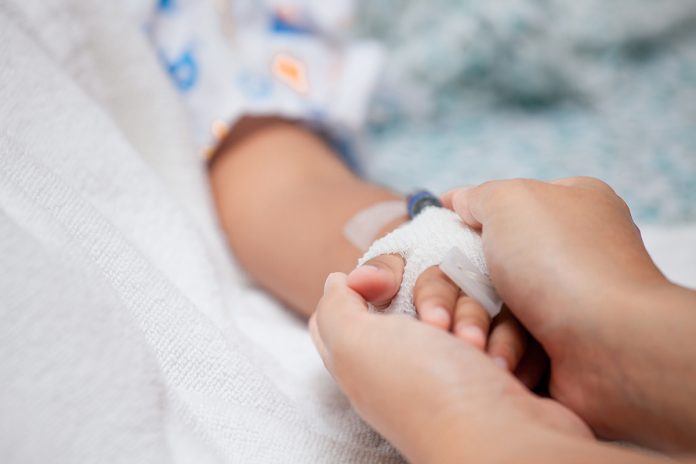In this analysis, Professor Keith Wheatley tells us about The ChiLTERN project, the most comprehensive research study ever undertaken in children’s liver cancer
The Children’s Liver Tumour European Research Network (ChiLTERN) is an ambitious five-year project that will define effective healthcare interventions in children’s liver cancer, increase our knowledge of the biology of the disease and improve surgical outcomes. It is funded by the European Union’s Horizon 2020 programme and coordinated by the University of Birmingham, UK, with Professor Keith Wheatley as the Project Coordinator.
There are two types of liver cancer in children: hepatoblastoma (HB), which occurs predominantly in children (especially under the age of three) and young adults, and hepatocellular carcinoma (HCC), which is much rarer in children and occurs mainly in teenagers. Treatment of HB usually requires chemotherapy, followed by surgery to the affected part of the liver or liver transplantation. The prognosis for children with HB is very good, with over 90% surviving. HCC tends to be more difficult to treat, since tumours are often large and may have spread at the time of presentation meaning that surgery may not be possible, leading to fewer than half of children with HCC being cured.
The project is divided into seven work packages (WPs), the first of which relates to the management of ChiLTERN and involves Project Manager Lou Woodall overseeing ChiLTERN from an administrative perspective.
WP2 is the PHITT trial (lead: Bruce Morland, Birmingham, UK). Patients are divided into six main groups – four HB and two HCC – with randomised comparisons in four of these groups. Low-risk HB patients who are resectable after two courses of cisplatin therapy are randomised between receiving four further courses – the current standard – or just two more to determine whether a total of four courses of cisplatin is just as effective as six courses, but leads to less toxicity. Intermediate-risk HB patients are randomised to receive one of three different chemotherapy regimens: the current European standard, the current American standard or single-agent cisplatin. High-risk HB patients – those with metastases at diagnosis who fail to respond to their initial induction chemotherapy – are randomised between two novel drug regimens.
HCC patients fall into two groups; resectable and unresectable disease. Patients with unresectable disease are randomised between standard treatment (cisplatin, doxorubicin, sorafenib) and a regimen that also includes gemcitabine and oxaliplatin.
The PHITT trial is now open in six European countries – the first patient was entered from the UK in November 2017 – and will open in eight other European countries. The SIOPEL group has been running clinical trials in Europe for many years and, around the world, other groups such as the Children’s Oncology Group (COG) in the U.S. and the Japanese Children’s Cancer Group (JCCG) also run trials. Given the rarity of HB and HCC in children, it is sensible for these groups to come together and collaborate in order to undertake larger and, hence, more reliable trials. This is what is happening with PHITT and the trial is also now open in the U.S. and Japan.
WP3 (lead: Càrolina Armengol, Barcelona, Spain) involves biology studies and will create the first European biorepository of biological samples and provide a panel of validated diagnostic and prognostic biomarkers. One objective is to decipher the biology of liver tumours to understand why they arise in children and to distinguish different cancer subtypes according to their molecular traits, which could explain differences in prognosis. Experimental models are also being established that reproduce the broad spectrum of human disease to assess the anti-tumour effects of new drugs against specific molecular targets.
WP4 (lead: Beate Häberle, Munich, Germany) will validate the current prognostic index created by an international group called the Children’s Hepatic Tumours International Collaboration (CHIC), which previously analysed data from several HB studies in order to produce a prognostic index. Additionally, relevant parameters from the biomarker studies in WP3 will be incorporated to create an improved prognostic index. It is hoped that this will lead to improved treatment by enabling therapy to be chosen based on the molecular tumour traits of each patient, as well as clinical and pathological features.
WP5 (lead: Steven Warmann, Tübingen, Germany) will evaluate a novel surgical planning system that seeks to improve the accuracy of the operation and, thereby, surgical outcomes.
WP6 (lead: Gareth Veal, Newcastle, UK) will identify novel biomarkers of toxicity to predict children who may have an increased risk of developing toxicity, which is a major drawback to current treatment and can lead to serious long-term effects including hearing loss, kidney toxicity and impairment of heart function.
WP7 concerns dissemination and communication of the project’s outputs. As well as involving the clinical and academic communities, patient and public involvement (PPI) is an important part of ChiLTERN and a PPI group to advise on issues that are important to patients and their families is being established.
In summary, ChiLTERN is a European network that will undertake the largest clinical trial ever in children’s liver cancer, along with associated laboratory projects and a surgical study. A project as large and complex as ChiLTERN requires input from many different people with a wide range of expertise – academic clinicians, trials methodologists and statisticians, laboratory scientists, surgeons, trial management staff, doctors and nurses in participating hospitals – who have all come together to improve the outcomes for paediatric liver cancer.
Funding: This project has received funding from the European Union’s Horizon 2020 research and innovation programme under grant agreement No. 668596.
Professor Keith Wheatley
Professor of Clinical Trials
University of Birmingham
Tel: +44 (0)1214159119
www.birmingham.ac.uk/generic/chiltern/index.aspx
Twitter: @chilterncollab
*Please note: this is a commercial profile











